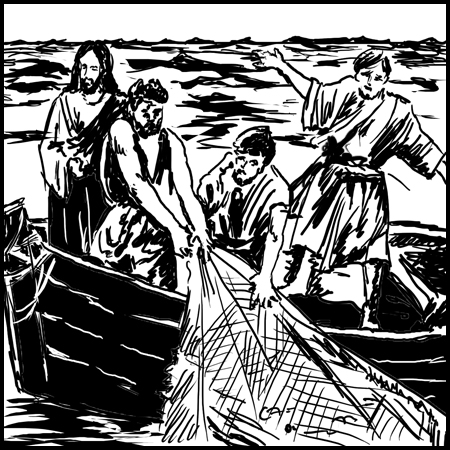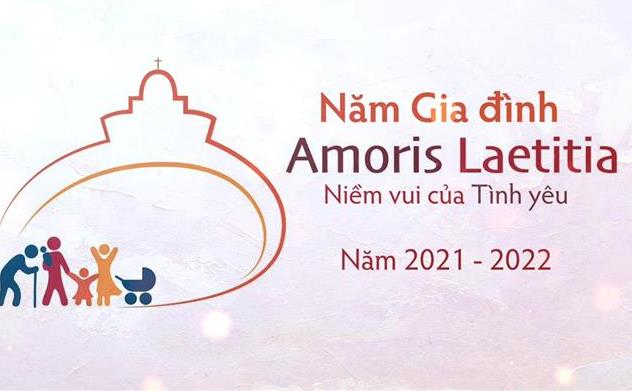 5 Sunday of the Year C
5 Sunday of the Year C
Is 6:1-2a, 3-8; 1Cor 15:1-11; Lk 5:1-11
Introduction: This is a homily/Scripture reflection in a book, titled: ‘Every Week God Speaks We Respond’ Cycle C, intended to be published in the future by Reverend John Tran Binh Trong. It was published in Vietnamese in the US 2009 and republished in Viet Nam 2012. To keep the author’s writing style, this homily has not been edited and may not be by a hired hand.
However, if readers like to point out mistake(s) in spelling and grammar, it would be greatly appreciated by the author whose English is not his mother tongue and who did not live in the US until his adulthood. Passive sentences are used intentionally in this context to avoid using the first personal pronoun ‘I’ when applicable, that might be associated with any idea of egotism, in accord with the French saying, known as: ‘Le moi est haissable’ (The ego is detestable).
The liturgy of the Word today has a common theme: God’s call and man’s response: the call of Isaiah to be a prophet, the call of Paul to be an apostle of the gentiles, the call of Peter to be a fisher of man. Although all three men: Isaiah, Paul and Peter received God’s call at a different time to do God’s work, they went through a similar religious experience and came up with a similar decision of acceptance.
First, they were aware of God’s holy presence. Secondly, they were aware of their weakness, sinfulness and unworthiness to do God’s work. That is why Isaiah cried out: Woe is I, I am doomed! For I am a man of unclean lips, living among people of unclean lips; yet my eyes have seen the King; the Lord of hosts (Is 6:5). As for Paul, when called by God, he excused himself: I am the least of the apostles, not fit to be called an apostle, because I persecuted the church of God (1Cr 15:9). Saint Paul also confessed his weakness and three times begged God to take away a thorn in the flesh (2Cor 12:7-8). Christ said to him: My grace is enough for you, for in weakness power reaches perfection (2 Cor 12:9). It was Peter to lower the nets all night long without catching anything. When seeing the nets full of fish because of God’s power, Peter, feeling unworthy, exclaimed: Depart from me, Lord, for I am a sinful man (Lk 5:8). Jesus did not say if sinful, he would not be worthy to follow him. Jesus said: From now on, you will be catching men (Lk 5:10).
Finally, despite of their weakness, sinfulness and unworthiness, the three men accepted God’s call with conviction of forgiveness. In addition, they put their faith in God’s mercy and trust in his power to transform their lives. After his tongue had been purified, Isaiah was ready to accept his calling: Here I am, send me (Is 6:8). Paul testified that God’s grace was with him when he wrote: By God’s favor, I am what I am. This favor of his to me has not proved fruitless (1Cor 15:10). As for Peter, when he was called by Jesus, he left everything and followed him (Lk 5:11).
The catch of fish by God’s power still has some good effect on a fishing business at the Sea of Galilee. Travelling to the Sea of Galilee, as soon as you just get off the bus, you can smell something good. That comes from a local restaurant with a dish called St Peter’s fish. Smell so good that even though you do not care much for fish, you still want to try it. They fry the fresh fish completely just caught from the Sea of Galilee. To be there and not try this fish is something historically missed. Whoever goes there should try it in memory of St Peter’s big catch in today’s Gospel.
God’s call does not change the nature and attitude of Isaiah, Paul and Peter. They have not lost their sense of weakness and sinfulness. Peter has not changed his quick temper. Now they realize that God can use people of weakness and sinfulness to do his work of salvation. What is still lacking in them, God will supply and compensate.
Some Christians being aware of their weakness and sinfulness excuse themselves from doing work for God and his people. They think God must not call them to do his work. They think to do God’s work is something reserved for priests and religious men and women. They think to do God’s work they must receive a personal touch from God. Today we must come to realize that through baptism and confirmation, each Christian is called to do apostolic work, spreading his kingdom.
Reading the history of the Church, we can see when God wanted to leave a profound impression of his power, he did use exceptional means. That was the way he used when he called Paul, Augustine or a sinful, yet repentant woman to conversion. The above are some examples of a dramatic conversion to the faith. However, for most of us, faith enters our lives quietly and grows slowly that we can hardly notice a difference. In other words, the road we come to God does not go through a clear-cut turning point of 90 degrees like the case of Saint Paul, Saint Augustine, from notorious sinners to great saints. Some people might be jealous of these saints because they received a clear-cut call to conversion.
For most of us, God has entered our lives in a quiet and gentle way from infancy through baptism to adulthood, then to old age. It is our continuing response to God’s call that we recognize God’s mysterious way each day a little. Sometimes we may ask ourselves why God has called us while there are many others, who are more talented in many areas, and yet they have not been called or they have not responded. At times, we have passed through crooked paths and rough steps of life on the way of God’s call. Other times we have experienced dark clouds covering our minds and hearts, struggles between reason and heart before we have reached a stable life and a peace of mind. When our mind and heart have been at peace in our dedicated life, we wonder why we have hesitated in response to God’s call and at times, we have been in doubt about his call.
In order for God’s power to be at work, we have to admit our weakness and sinfulness, our limitations and failures, and then we ask God’s help to do his work. We can say to God something like this: My Lord, sinful as I am, and do you call me? If you still call me, then I respond, but I do not have any special talent for the task. So help me and transform me into your instrument. I dare not rely on my own. Our response to God’s call depends on our cooperation with his grace. Our human nature is weak and sinful. When God calls us to be somebody or to do something for him, he will give us sufficient grace to fulfill our calling.
A prayer asking for the grace to respond to God’s call:
Oh God, the all mighty and all present!
Every day you call me to do something for you.
You know I am weak and sinful by nature.
Grant that I may rely on your grace
so as to allow you to use me.
Transform me into your instrument. Amen.
John Tran Binh Trong



 Every Week God Speaks – We Respond, Cycle A was published Online in the US. The introduction of the book is recorded at “Sách của Tác giả Chủ trương, Column 1.
Every Week God Speaks – We Respond, Cycle A was published Online in the US. The introduction of the book is recorded at “Sách của Tác giả Chủ trương, Column 1.

 Năm Mục Vụ Giới Trẻ 2021. HĐGM ấn định một chương trình Mục vụ Giới trẻ 3 năm với các chủ đề tương ứng: Năm 2020: Đồng hành với người trẻ hướng tới sự trưởng thành toàn diện.
Năm Mục Vụ Giới Trẻ 2021. HĐGM ấn định một chương trình Mục vụ Giới trẻ 3 năm với các chủ đề tương ứng: Năm 2020: Đồng hành với người trẻ hướng tới sự trưởng thành toàn diện. Năm Thánh Giu-se: Nhân kỷ niệm 150 năm Đức Giáo hoàng Pio IX chọn thánh Giuse làm Đấng Bảo Trợ Giáo Hội Công Giáo, Đức Phanxicô đã ban hành Tông thư “Patris corde” – Trái tim của người Cha – và công bố “Năm đặc biệt về thánh Giuse” từ
Năm Thánh Giu-se: Nhân kỷ niệm 150 năm Đức Giáo hoàng Pio IX chọn thánh Giuse làm Đấng Bảo Trợ Giáo Hội Công Giáo, Đức Phanxicô đã ban hành Tông thư “Patris corde” – Trái tim của người Cha – và công bố “Năm đặc biệt về thánh Giuse” từ  Năm “Gia đình Amoris Laetitia” 2021 về “Vẻ đẹp và niềm vui của tình yêu gia đình” do Bộ Giáo Dân, Gia Đình và Sự Sống tổ chức, được Đức Phanxicô khai mạc dịp Lễ Thánh Giuse
Năm “Gia đình Amoris Laetitia” 2021 về “Vẻ đẹp và niềm vui của tình yêu gia đình” do Bộ Giáo Dân, Gia Đình và Sự Sống tổ chức, được Đức Phanxicô khai mạc dịp Lễ Thánh Giuse 
